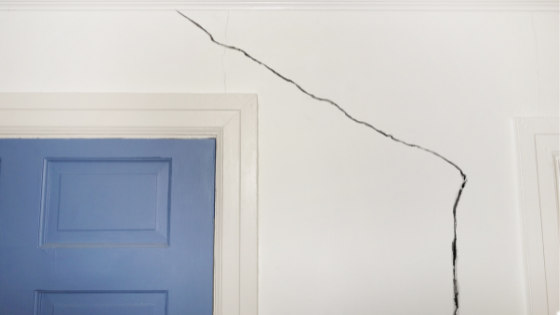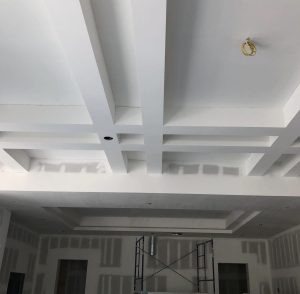A home’s look and feel are greatly impacted by the appearance and condition of its interior walls. A home’s walls should be maintained, properly painted, and demonstrate drywall finishing that’s free of visible damage. This can be the difference between a home that’s warm and welcoming and one that feels drab and lacklustre.
A homeowner can quickly do many everyday tasks to keep the home’s walls looking good. For example, washing down walls, trim and baseboards, can be done regularly. Filling small nail holes are also simple tasks that can also be undertaken. Even certain kinds of wall cracks aren’t a problem for many DIY homeowners.
However, other issues should be left to the pros. In this article, we’re sharing 5 signs when it’s time to call a professional for drywall repair and maintenance services.
Visible Drywall Finishing Cracks
A drywall crack alone doesn’t necessarily mean it’s time to bring in a professional contractor. Small hairline cracks above windows and doors are a common sign the house has undergone natural settling processes. They are relatively easy to repair and can be done with ordinary drywall mud or spackle, a putty knife, and fine-grit sandpaper.
However, other types of cracks are more challenging to repair and can even signal a cause for concern. If any of the following types of drywall cracks are visible on your walls, we highly recommend consulting a professional for repairs.
4 Common Drywall Cracks of Concern
- Recurring hairline cracks. If pesky cracks around door and window frames repeatedly return, they may need a professional drywaller to nip them in the bud once and for all.
- Long, jagged crack. This could be a sign that there are structural issues in the home. It’s best to call a professional sooner than later to have the problem properly assessed.
- Long, thin, straight crack. Long, thin cracks signify that the drywall tape isn’t adhering properly, likely due to poor installation techniques. While it should be repaired by a professional, it usually doesn’t signal a more concerning problem is developing in the home.
- Horizontal cracks. Horizontal cracks can often be bad news for homeowners. They are common symptoms of underlying foundation or structural problems. Don’t avoid repairing a horizontal crack, and always consult a professional to fix it properly.
Hole in Wall or Ceiling
Holes in a home with drywall can happen quite easily. Drywall comprises two paperboards, and a lightweight powder called gypsum is sandwiched between them. Used by builders in North America for decades, it’s a favoured material because of its ease of use, durability, and low cost. Unfortunately, drywall, also known as sheetrock, can be damaged relatively easily.
Small Drywall Holes
When a hole does develop in a home’s wall or ceiling, and if it’s small enough, it can be repaired by a homeowner. Hardware stores carry different wall repair kits that can do the job nicely. The downside of a repair kit is that the result can appear very poor if not done correctly, and the patch job will be obvious. Consult a drywall repair specialist if you’re not comfortable with your drywall repair skills.
Holes are considered small if they are less than 6 inches in diameter.
Large Drywall Holes
Holes greater than 6 inches in diameter require a more thorough repair than small holes. Depending on the location and size of the hole, it may require cutting out the damaged area and replacing a large section of drywall. For this, we recommend paying for professional drywall services to complete the job.
Ceiling Holes
While patching an area of ceiling entails the same process as a vertical wall surface, it may be best to outsource the repair because of the difficult angle and space of the work area. Additionally, suppose the ceiling is textured, such as a popcorn finish or other texture. In that case, it can be challenging to create a seamless finish.
Professional drywall finishers have the skills and experience to make the ceiling’s final result appear consistent and blend seamlessly with the untouched areas.
Wall Discolouration
Wall or ceiling discolouration is a sure sign that something unplanned is happening behind walls that requires attention. Reaching out to a local handyman is a great first step to resolving the issue. They can assess the discolouration as well as help determine if other tradespeople, such as electricians or plumbers, should get involved.
Common reasons for a section of drywall to become discoloured include:
- Water damage
- Mould or Mildew
- Smoke damage
- High humidity
- Leaching from poor quality paint
- Poor hygiene or cleaning processes
- Food and cooking stains
Texture Changes
Trends in wall and ceiling textures evolve alongside interior decor trends. Popcorn ceilings, a ubiquitous sight in late 20th century homes, were favoured by residential home builders and buyers. In recent years, an interest in wall texture is developing, with styles such as “knockdown” or “orange peel” becoming increasingly popular.
Shifting from one texture to another isn’t as simple a process as many homes and garden shows would have you believe. It’s a long process that requires consistency, expertise, and extensive knowledge of caring for wall and ceiling surfaces. When altering the texture of your home’s walls or ceilings, or when installing new wainscotting, consult a drywall specialist to guarantee results with a professional-looking finish.
Finest Finish: Offering Superior Drywall Finishing Services in Victoria, BC
Expert drywall finishing and installation are vital for a space’s walls and ceilings to appear crisp, smooth and professional. Our years of experience in the construction finishing industry have allowed us to develop and hone our skills at a superior level. Visit our website to learn more about our specialist skills and services.






